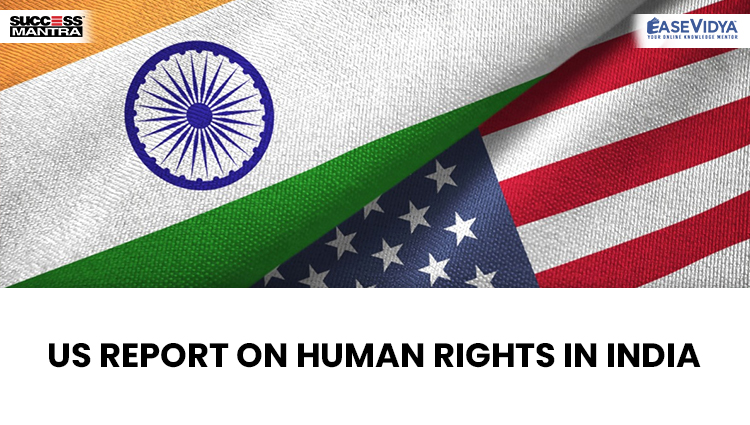
US REPORT ON HUMAN RIGHTS IN INDIA
US REPORT ON HUMAN RIGHTS IN INDIA
Recently, the US State Department released a strong and critical report on human rights in India in 2021. The report is submitted each year to the US Congress which is retrospective and contains a country-wise discussion of the state of internationally recognised individual, civil, political and worker rights, as set forth in the Universal Declaration of Human Rights and other international agreements. In December 2021, data related to human rights violations in states was provided by the Ministry of Home Affairs in Rajya sabha.
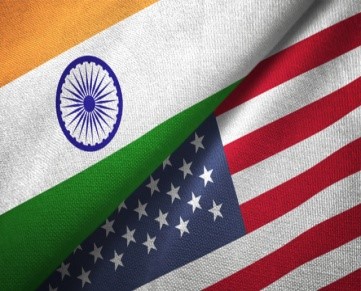
WHAT ARE THE KEY HIGHLIGHTS OF THE REPORT?
- Arbitrary Arrest and Detention: Indian law “prohibits arbitrary arrest and detention but both occurred during the year”, with police using “special security laws to postpone judicial reviews of arrests”. Pretrial detention was arbitrary and lengthy, sometimes exceeding the duration of the sentence given to those convicted.
- Violations of Privacy: Citing media reports on journalists being targeted for surveillance through the Pegasus malware, the report flagged violations of privacy by government authorities, “including the use of technology to arbitrarily or unlawfully surveil or interfere with the privacy of individuals”.
- On Freedom of Association: The report highlighted the cases of Amnesty International India, whose assets were frozen by the Enforcement Directorate, and the suspension of the Foreign Contribution (Regulation) Act (FCRA) license of Commonwealth Human Rights Initiative (CHRI) for alleged violations.
- What are Human Rights: These are rights inherent to all human beings, regardless of race, sex, nationality, ethnicity, language, religion, or any other status. These include the right to life and liberty, freedom from slavery and torture, freedom of opinion and expression, the right to work and education, and many more. Nelson Mandela had stated ‘To deny people their human rights is to challenge their very humanity’.
Current Affairs Notes By Success Mantra Coaching Institute GTB Nagar Delhi CLICK HERE
HUMAN RIGHTS RELATED PROVISIONS IN INDIA
- Fundamental Rights: Articles 12 to 35 of the Constitution. These include the Right to Equality, Right to Freedom, Right against Exploitation, Right to Freedom of Religion, Cultural & Educational Rights, Saving of Certain Laws and Right to Constitutional Remedies.
- Directive Principles of State Policy: Article 36 to 51 of the Constitution. These include 'right to social security, right to work, to free choice of employment, and protection against unemployment, right to equal pay for equal work, right to existence worthy of human dignity, right to free & compulsory education, equal justice & free legal aid and the principles of policy to be followed by the State.
Statutory Provisions:
Protection of Human Rights Act (PHRA), 1993 (as amended in 2019) provided for the constitution of a National Human Rights Commission at the Union level, which steers State Human Rights Commission in States and Human Rights Courts for better protection of Human Rights and for matters connected therewith or incidental thereto. Section 2(1)(d) of the PHRA defines Human Rights as the rights relating to life, liberty, equality and dignity of the individual guaranteed by the Constitution or embodied in the International Covenants and enforceable by courts in India. India took an active part in drafting of the Universal Declaration of Human Rights (UDHR). These 30 rights and freedoms include civil and political rights, like the right to life, liberty, free speech and privacy and economic, social and cultural rights, like the right to social security, health and education, etc.
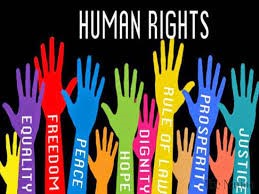
RELATED: HUMAN RIGHTS DAY: 10TH DECEMBER
Every year Human Rights Day is celebrated on 10th December all around the world. Freedom in the World 2021 report released earlier this year had downgraded India’s status from ‘Free’ to ‘Partly Free’.
World Human Rights Day: On that day, the United Nations General Assembly adopted, in 1948, the Universal Declaration of Human Rights (UDHR). The UDHR established a set of common basic values both with regard to the view of human beings and to the relationship between the state and the individual.
Theme 2021: “EQUALITY – Reducing inequalities, advancing human rights''.
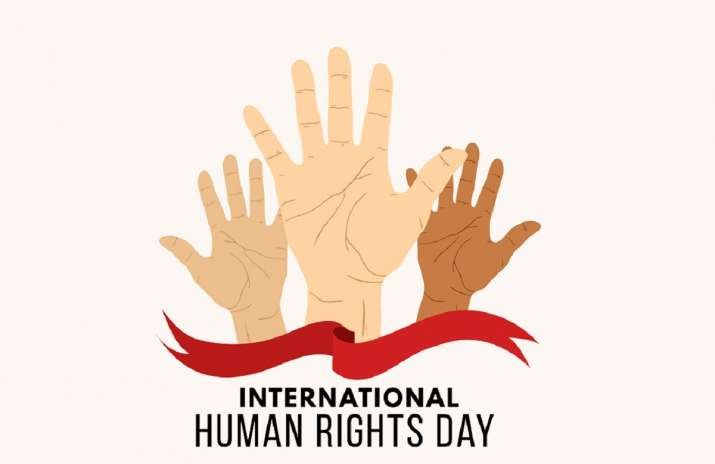
International Human Rights Conventions and Bodies:
Universal Declaration of Human Rights (UDHR): The 30 rights and freedoms include civil and political rights, like the right to life, liberty, free speech and privacy and economic, social and cultural rights, like the right to social security, health and education, etc. India took an active part in drafting of the UDHR. The UDHR is not a treaty, so it does not directly create legal obligations for countries. The UDHR, together with the International Covenant on Civil and Political Rights and its two Optional Protocols (on the complaints procedure and on the death penalty) and the International Covenant on Economic, Social and Cultural Rights and its Optional Protocol, form the so-called International Bill of Human Rights.
Other Conventions: These include the Convention on the Prevention and Punishment of the Crime of Genocide (1948), the International Convention on the Elimination of All Forms of Racial Discrimination (1965), the Convention on the Elimination of All Forms of Discrimination against Women (1979), the Convention on the Rights of the Child (1989) and the Convention on the Rights of Persons with Disabilities (2006), among others. India is a party to all these Conventions.
Human Rights Council: The Human Rights Council is an inter-governmental body within the United Nations system responsible for strengthening the promotion and protection of human rights. It is made up of 47 United Nations Member States which are elected by the UN General Assembly. The most innovative feature of the Human Rights Council is the Universal Periodic Review. This unique mechanism involves a review of the human rights records of all 192 UN member states once every four years. The Office of the High Commissioner for Human Rights (OHCHR) serves as the secretariat for the Human Rights Council.
Amnesty International: An international organisation of volunteers who campaign for human rights. This organisation brings out independent reports on the violation of human rights all over the world.
PRAVAHINI Current Affairs Notes By Success Mantra Coaching Institute GTB Nagar Delhi CLICK HERE
NATIONAL HUMAN RIGHTS COMMISSION (NHRC)
- Statutory Body: NHRC was established on 12th October, 1993. The statute under which it is established is the Protection of Human Rights Act (PHRA), 1993 as amended by the Protection of Human Rights (Amendment) Act, 2006. The PHRA Act also provides for the creation of a State Human Rights Commission at the state level.
- In Line with Paris Principles: Paris Principles were adopted for the promotion and protection of human rights in October 1991, and were endorsed by the General Assembly of the United Nations in 1993.
- Watchdog of Human Rights in the country: The NHRC is an embodiment of India’s concern for the promotion and protection of human rights. Section 2(1)(d) of the PHRA defines Human Rights as the rights relating to life, liberty, equality and dignity of the individual guaranteed by the Constitution or embodied in the International Covenants and enforceable by courts in India.
- Composition: The commission is a multi-member body consisting of a chairman and four members. A person who has been the Chief Justice of India or a judge of the Supreme Court is a chairman.
- Appointment: The chairman and members are appointed by the President on the recommendations of a six-member committee consisting of the Prime Minister as its head, the Speaker of the Lok Sabha, the Deputy Chairman of the Rajya Sabha, leaders of the Opposition in both the Houses of Parliament and the Union Home Minister.
- Tenure: The chairman and members hold office for a term of three years or until they attain the age of 70 years, whichever is earlier. The President can remove the chairman or any member from the office under some circumstances.
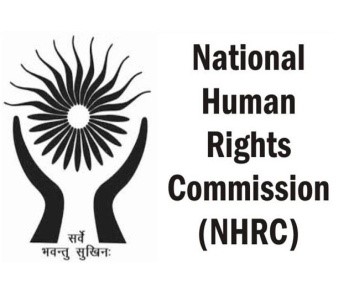
TEST YOURSELF
Q.1 Which of the following legislations provided for the constitution of a National Human Rights Commission at the Union level, which steers State Human Rights Commission in States and Human Rights Courts for better protection of Human Rights?
- Prevention and Punishment of the Crime of Genocide Act (1948)
- International Convention on the Elimination of All Forms of Racial Discrimination (1965)
- Protection of Human Rights Act (PHRA), 1993: ANSWER
- None of the following
Q.2 Consider the given statements & state which of the following is/are correct in the reference to the United Nations Human Rights Council (UNHRC)?
- The Human Rights Council is an inter-governmental body within the United Nations system responsible for strengthening the promotion and protection of human rights.
- It is made up of 147 United Nations Member States which are elected by the UN General Assembly.
- Only I follows: ANSWER
- Only II follows
- Both I & II follows
- None of the above-mentioned
Q.3 Which of the following country's membership was recently suspended by the UN Human Rights Council (UNHRC)?
- Ukraine
- Russia: ANSWER
- United States of America
- None of the following
Q.4 From the given options, which of the following is the current President of the United Nations Human Rights Council (UNHRC)?
- Tedros Adhanom Ghebreyesus
- Catherine M. Russell
- Federico Villegas: ANSWER
- None of the following
Q.5 From the given options, which of the following is/are correct regarding the theme for the Human Rights Day?
- "Youth Standing Up for Human Rights"
- “EQUALITY – Reducing inequalities, advancing human rights'': ANSWER
- "Recover Better by ensuring human rights"
- None of the following












0 Comment